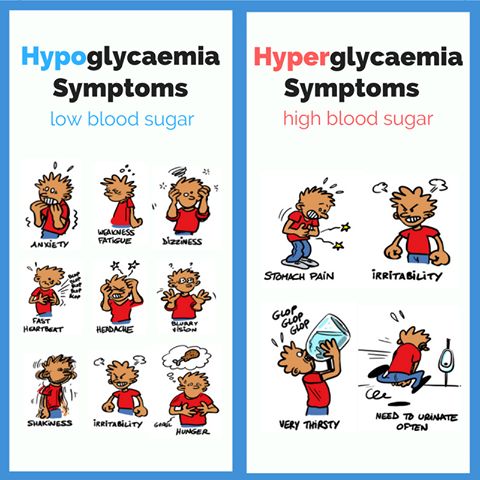
Symptoms of hypoglycemia can include many different conditions associated with low sugar levels in the body
In most cases, they result from a sudden drop in blood glucose levels. When blood glucose levels drop, the body releases adrenaline (adrenaline). This hormone causes symptoms of hypoglycemic conditions such as tingling, sweating, trembling and anxiety.
The symptoms of hyperglycemia occur when a person suffers from one of two types of hypoglycemic conditions. More common in children. In these cases, there is a rapid drop in blood glucose levels, usually within the first few minutes. Some of the effects of these low glucose levels are increased hunger, vomiting, diarrhea, seizures, hypoglycemic cardiac arrhythmias, and brain damage.
Children who have hypoglycemic conditions and symptoms of hyperglycemia are most likely to develop the following problems. They may have trouble concentrating, poor memory, or judgment. They are also prone to risky behaviors such as excessive drinking, drugs, smoking and reckless driving.
Signs of hypoglycemic conditions can show up early, even in very young children. While the cause of their symptoms cannot always be understood, most experts believe that some cases are due to a deficiency in the production of certain enzymes that help the body absorb glucose. When these enzymes are absent, an imbalance occurs in the process by which sugar enters the bloodstream and is then used for energy.
The best way to combat this deficiency is to ensure that the child's diet is rich in fiber and that he or she gets enough protein. This will help to slow down the onset of symptoms so that the child's brain has time to make the correct decisions about which of the possible causes of the condition are more important and which needs immediate attention.
Symptoms of hypoglycemia can be caused by a wide range of factors. Some examples are stress, high blood pressure, long hours in bed, lack of sleep, dehydration, vomiting, and dehydration. can all cause temporary hypoglycemic conditions. or have a long term impact. These conditions are usually treated with medication that will help the body adjust to the new level of glucose and make the necessary changes in the system so that the symptoms do not occur.
Symptoms of hyperglycemia are typically caused by a much greater cause. They can be caused by too much consumption of foods with a high glycemic index, taking diuretics to reduce fluid levels, taking diabetes medications, or a lack of exercise. The only way to get the full picture about a condition is to speak to a doctor and get as much information as possible about any symptoms you might have.
Symptoms of hypoglycemic conditions are also found in adults and children. They include fatigue, irritability, anxiety, dizziness, and nervousness. There may also be some cases where the symptoms are so severe that the child is unable to function properly at home.
Children who suffer from hypoglycemia might feel hungry often, or experience hunger pangs. When they eat, the child might be more prone to cramps or vomit than other children, especially if the amount of carbohydrate they have ingested is high. In children, symptoms of hypoglycemia may also include decreased growth in the child's height and growth in weight.
If the symptoms of hypoglycemia affect a child, it is important to speak with a physician immediately. The child's life could be in danger if his or her brain does not respond appropriately to a treatment that can reduce the effects of hypoglycemia.
Symptoms of hypoglycemia can be mild or severe. Mild hypoglycemia can be treated with diet and exercise, while others might require medication. In severe cases, doctors might prescribe medication or insulin to reduce the symptoms of hypoglycemia.
Although these symptoms of hypoglycemia are not life-threatening, your child's life could be in danger if he or she is allowed to continue using unhealthy treatments. If the condition is not treated early, the child may eventually develop permanent damage to the brain that could be harmful to the child's mental and emotional health.